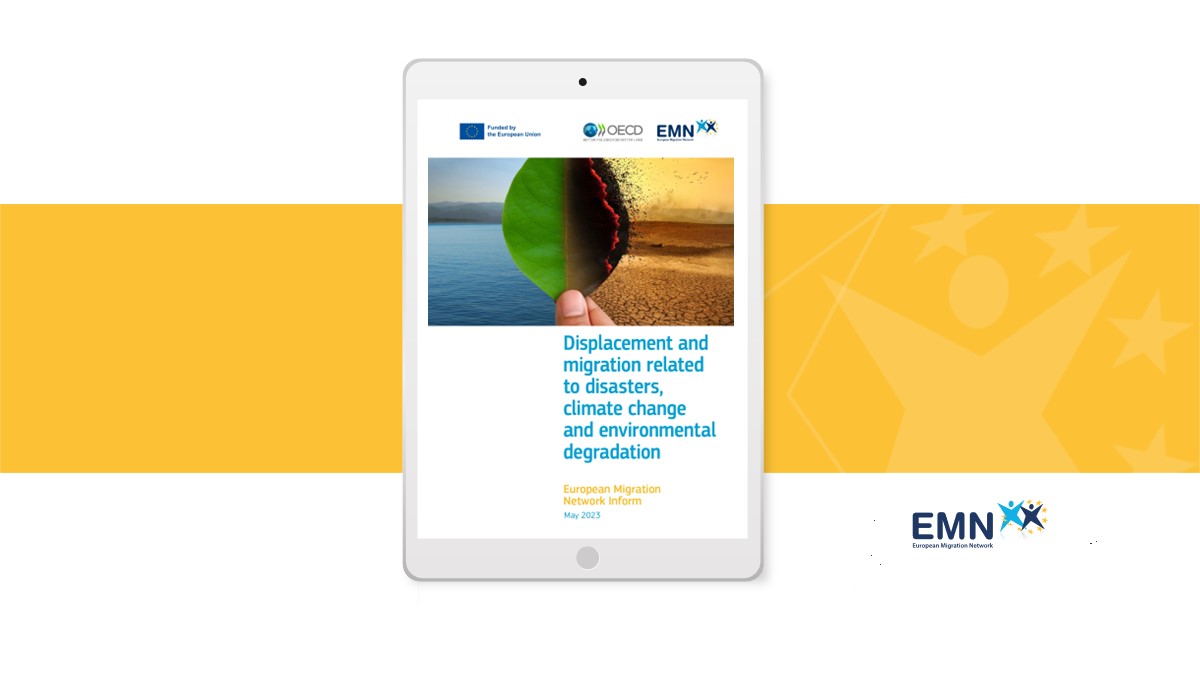As more and more people are affected by climate change, the need to understand and prepare for climate-related migration has increased. This inform aims to complement existing research by providing a broader perspective on how displacement and migration related to disasters, climate change and environmental degradation are being addressed by key national-level initiatives and policies in EMN Member Countries as well as non-EU OECD countries.
According to the United Nations High Commissioner for Refugees (UNHCR), extreme weather events, such as abnormally intense rainfall, prolonged droughts, heat waves and cyclones are linked to the displacement of approximately 20 million+ people annually. Despite the fact that more people are affected by climate change, it is difficult to directly link environmental degradation to displacement or people’s decision to migrate because of the complex interaction between environmental and other factors that can drive migration.
Although climate change is not mentioned as a reason for a well-founded fear of persecution under the 1951 Refugee Convention, environmental migrants could potentially benefit from the principle of non-refoulement if they were to be subjected to inhuman or degrading treatment in their country of origin upon return, as prohibited by Article 3 of the European Convention on Human Rights and Article 4 of the EU Charter of Fundamental Rights.
In recent years however, there have been some turning points. One of the most significant being the 2015 non-binding decision of the UN Human Rights Committee in the case of Ioane Teitiota which recognises the effects of climate change in the context of states’ non-refoulement obligations. After being denied asylum in New Zealand, Mr Teitiota filed a complaint with the UN Human Rights Committee, alleging that New Zealand had violated his right to life by deporting him. Mr Teitiota argued that rising sea levels and other effects of climate change had made Kiribati, his home country uninhabitable. Although the case was dismissed for absence of evidence, it demonstrates the potential applicability of human rights law to environmental cases and that inaction on global warming can lead to non-refoulement obligations.
At the national level, none of the reporting EMN Member Countries, except Italy have specific national legislation in place on climate-related migration and displacement caused by climate change, nor have they implemented or planned any specific measures to host third-country nationals that might be affected by climate change or climate disasters. Several countries, nonetheless, have protection grounds in place that may be invoked in the case of climate-related migration, or that may be used to prevent the return of third-country nationals. The Czech Republic and Lithuania reported that international protection is occasionally granted on other bases, for example on humanitarian grounds. Germany and France, on the other hand, reported that a removal ban can be considered if the danger is sufficiently concrete. This is the case for France where in 2020 an administrative decision taken by the court of Bordeaux revoked the order of a Bangladeshi citizen to leave French territory and gave him a residence permit on the basis of medical grounds because of the air pollution in the applicant’s country of origin. The decision, although to some extent climate-related, did not lead to a climate migrant status.
French translation of the Inform was kindly provided by EMN France.

